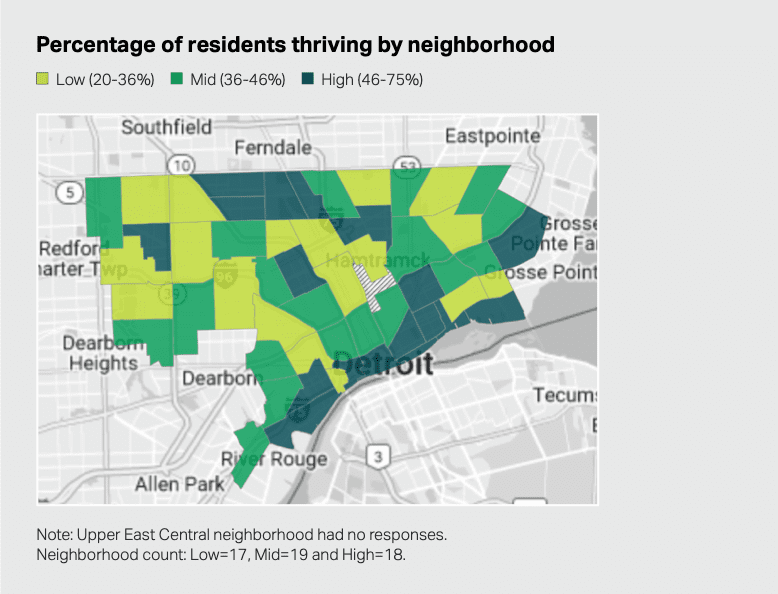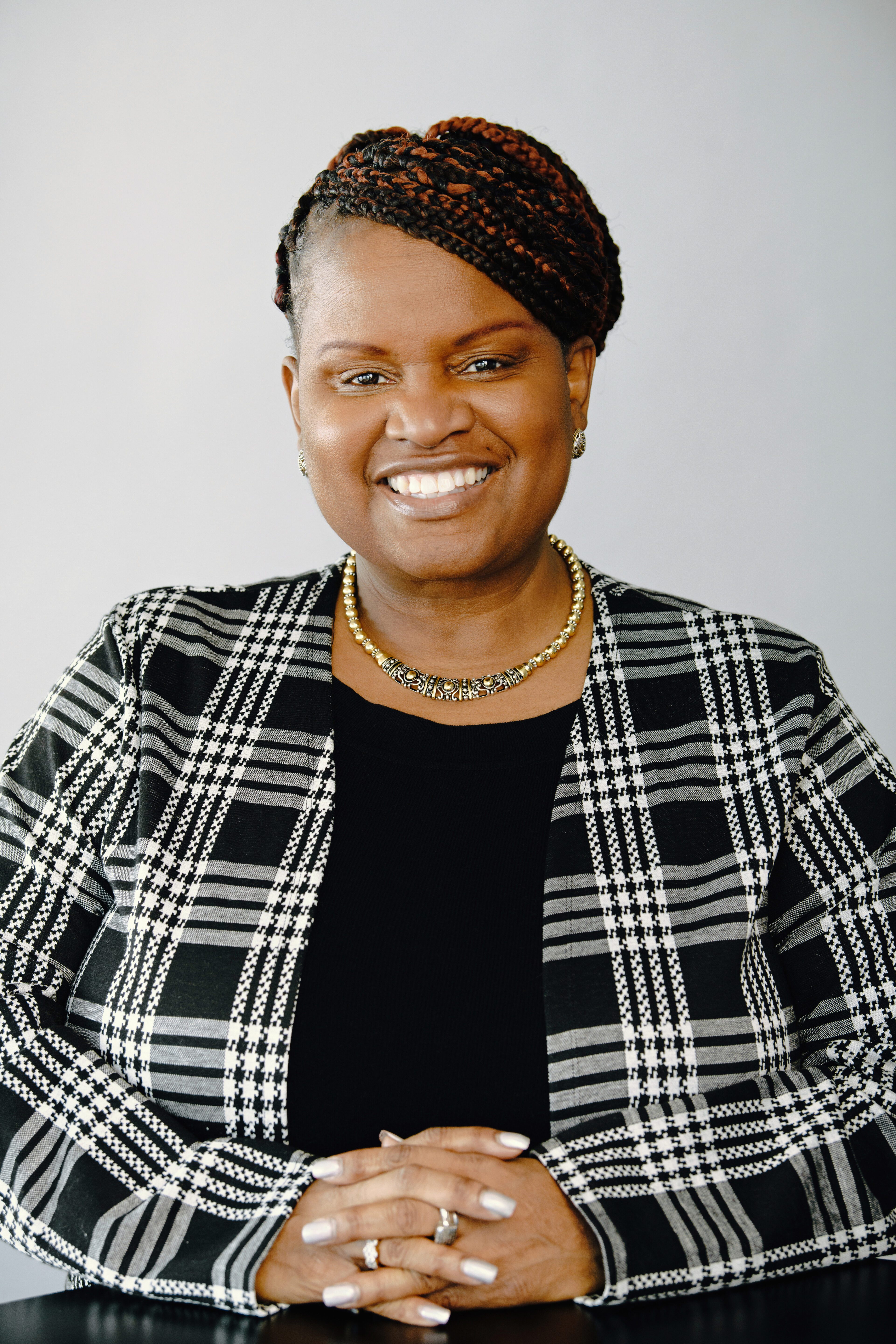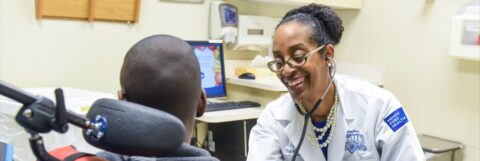By launching the Center on Black Voices in 2020, renowned research leader Gallup became the first organization in the world with a mission to answer the question: “Is the Black experience in America getting better or worse?”
As the Detroit Regional Chamber and Gallup begin partnering on the second Detroit Resident Voices Survey, Detroit will be the first city in the country able to answer that question with verified, locally generated data directly from its residents that can be broken down to the individual neighborhood.
This is part of Gallup’s 100-year commitment to tracking six areas where disparities have most negatively impacted life outcomes: justice, health and well-being, economic opportunity, education, jobs and work, and community and environment.
That data holds the key to driving collective action to improve the Black experience and ensure we are making progress in closing racial equity gaps across the city of Detroit.
The Nation’s First Hyperlocal Survey of Its Kind
The ongoing partnership between the Chamber and Gallup resulted in the first hyperlocal, city-specific survey of its kind, which we released at the 2023 Mackinac Policy Conference.
Funded with $1 million by local foundations and businesses and Gallup’s $250,000 in-kind donation, the survey was informed by our equity partners, which included The Skillman Foundation, Data Driven Detroit, Detroit Future City, the Damon Keith Center at Wayne State University, United Way, and New Detroit, among many others. It brought residents’ voices directly to the discussion about how to close the racial equity gaps that so greatly impact their lives and which are holding back the Detroit Region from reaching its full potential.
Building a community input model of over 50 other local grassroots organizations to guide the first survey was no small feat. Neither was conducting a massive survey that received more than 11,000 responses from Black Detroiters from the city of Detroit (over 6,200) and the surrounding tri-counties (over 5,200). Based on what we have learned by conducting the Detroit Resident Voices Survey, the Chamber is beginning to raise financial support to conduct a second and subsequent survey to better position the Detroit Region to take tangible steps toward closing racial equity gaps.
Bringing Resident Voices to the Decision-Making Process
 Bringing residents’ voices to the table is important to advancing racial equity in this country. Localizing these efforts is an approach that has not typically been employed in addressing inequities but allows us to amplify their voices and bring them into the decision-making process. One of the unique aspects of this survey is that it allows the respondent to determine what is “thriving” as opposed to some other entity to define (e.g., income level, educational level) what success looks like.
Bringing residents’ voices to the table is important to advancing racial equity in this country. Localizing these efforts is an approach that has not typically been employed in addressing inequities but allows us to amplify their voices and bring them into the decision-making process. One of the unique aspects of this survey is that it allows the respondent to determine what is “thriving” as opposed to some other entity to define (e.g., income level, educational level) what success looks like.
It also allows businesses to collaborate with civic and philanthropic partners working in the equity space to make a long-term substantive impact. The business community has been looking for ways to close racial equity gaps with increased intentionality since the murder of George Floyd. But it has not always been able to translate that into action.
Second Survey Offers New Customization to Drive Collective Action
The first Detroit Resident Voices Survey provided in-depth customized data offering a deep dive into Black Detroiters’ lives in a way that helps us better understand the perceptions, feelings, and life experiences, including quality of life, city services, and key daily experiences.
 Conducting future Detroit Resident Voices Surveys will allow us to compare year-over-year data for the first time while offering new levels of customization. If an organization wants to take on a specific issue in the city – such as access to quality health care or transportation — they can customize questions based on their priorities that deliver specific data directly from the residents. If an organization wants to focus on a certain area of the city, they can help gear the survey to focus on specific neighborhoods, offering access to much deeper analysis at the neighborhood level.
Conducting future Detroit Resident Voices Surveys will allow us to compare year-over-year data for the first time while offering new levels of customization. If an organization wants to take on a specific issue in the city – such as access to quality health care or transportation — they can customize questions based on their priorities that deliver specific data directly from the residents. If an organization wants to focus on a certain area of the city, they can help gear the survey to focus on specific neighborhoods, offering access to much deeper analysis at the neighborhood level.
Relatedly, our first survey showed that Indian Village, the locale of much investment and high-end home renovation, was considered the most “thriving” neighborhood in the city. The next highest is the Durfee area – a neighborhood with significant challenges and one that would not expect to be rated high in “thriving” – as rated a close second. A likely rationale for this finding is the presence of Life Remodeled’s Durfee Innovation Society. Not only are resources readily available for local residents, but such a substantial investment in the neighborhood makes residents feel seen and heard.
Findings like this can help shape community investments from philanthropy, business, and government moving forward.
Up Next: Data-Driven Collective Action
Once the second Detroit Resident Voices Survey is complete, the Detroit Regional Chamber will convene a collective action roundtable that is charged with charting the year-over-year progress of the collective action initiatives that result. The vision is for business, civic, community, and philanthropic organizations to work together on areas of shared interest and bring about change. Each subsequent survey will allow us to measure progress by collective action initiatives so that efforts can be adjusted and refined to deliver maximum impact.
It is this type of intentionality and data-driven action that is needed to drive meaningful change. It will help us create a more inclusive, equitable, and resilient economy that offers opportunity for all.
If successful, over time, we should be able to proudly answer the question: Is the Black experience in Detroit getting better or worse?
In doing so, we can demonstrate to the rest of the country how the business community can help close racial equity gaps and how Detroit is leading the way in building a more inclusive and equitable city and Region.
 Marnita S. Harris is Vice President of Racial Justice and Economic Equity for the Detroit Regional Chamber. To learn more about how to support the Detroit Resident Voices Survey, contact Marnita at mharris@detroitchamber.com.
Marnita S. Harris is Vice President of Racial Justice and Economic Equity for the Detroit Regional Chamber. To learn more about how to support the Detroit Resident Voices Survey, contact Marnita at mharris@detroitchamber.com.
Released by the Detroit Regional Chamber and Gallup Center on Black Voices, the survey report provides insights that can be used in the public, private, and philanthropic sectors to develop new programs and initiatives to identify and close racial equity gaps. It is part of the Chamber’s Racial Justice and Economic Equity Initiative.


